– Devayani Prasad, Anusha Sundar
 Our correspondence with Urmila was established through an encounter with a bus driver at TSRTC. We met Urmila on bus route 65M that travelled between Falaknuma and Mehdipatnam. We reached Afzalgunj bus stop at 8 A.M., not knowing that her bus had been delayed or (most importantly) what she looked like. After having waited for nearly an hour and a half, peeping into each bus to see if it had a female bus conductor, we finally boarded a small bus with only one hint of acknowledgement from a small woman with cropped hair (whom we presumed to be Urmila in our hurried state!) and went to sit at the back where only men usually sit. The bus driver, Krishna, was a jovial fellow who was very keen to know what we were up to and constantly kept himself in the loop by asking about us.
Our correspondence with Urmila was established through an encounter with a bus driver at TSRTC. We met Urmila on bus route 65M that travelled between Falaknuma and Mehdipatnam. We reached Afzalgunj bus stop at 8 A.M., not knowing that her bus had been delayed or (most importantly) what she looked like. After having waited for nearly an hour and a half, peeping into each bus to see if it had a female bus conductor, we finally boarded a small bus with only one hint of acknowledgement from a small woman with cropped hair (whom we presumed to be Urmila in our hurried state!) and went to sit at the back where only men usually sit. The bus driver, Krishna, was a jovial fellow who was very keen to know what we were up to and constantly kept himself in the loop by asking about us.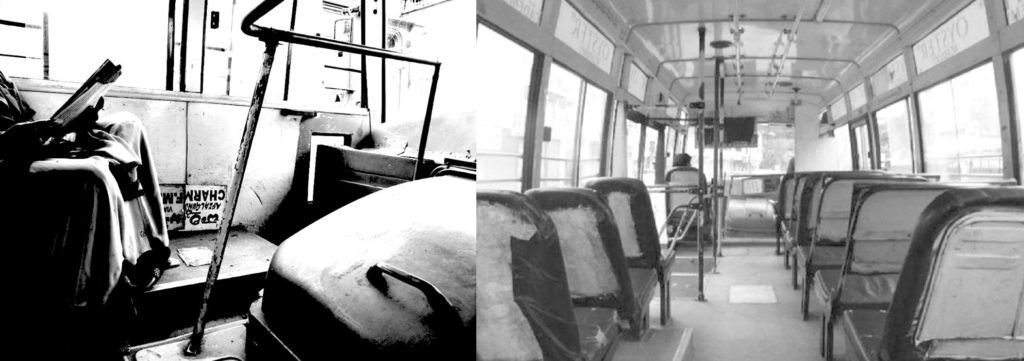
On the proposed Sunday, we boarded the bus at Falaknuma Bus Depot and bought a full day pass. Since it was Sunday and the month of Ramzan, it was a slow morning. Urmila was simultaneously pursuing a Masters’ degree in Public Administration from Ambedkar Open University in the hope of being upgraded to a desk job at TSRTC. While her husband worked as an accountant in a jewelry shop owned by her Uncle, Urmila maintained that she was encouraged to take up a job at TSRTC right after school as it provided a steady income. Throughout our bus journey, Urmila was constantly on her phone, updating her husband about her day and inquiring about his.
***
One of the first things that struck us was the amusing relationship Urmila shared with Krishna- a blend of professional and personal. As Krishna boarded the bus after ten minutes of an agitated phone call at the Charminar stop over, Urmila said:
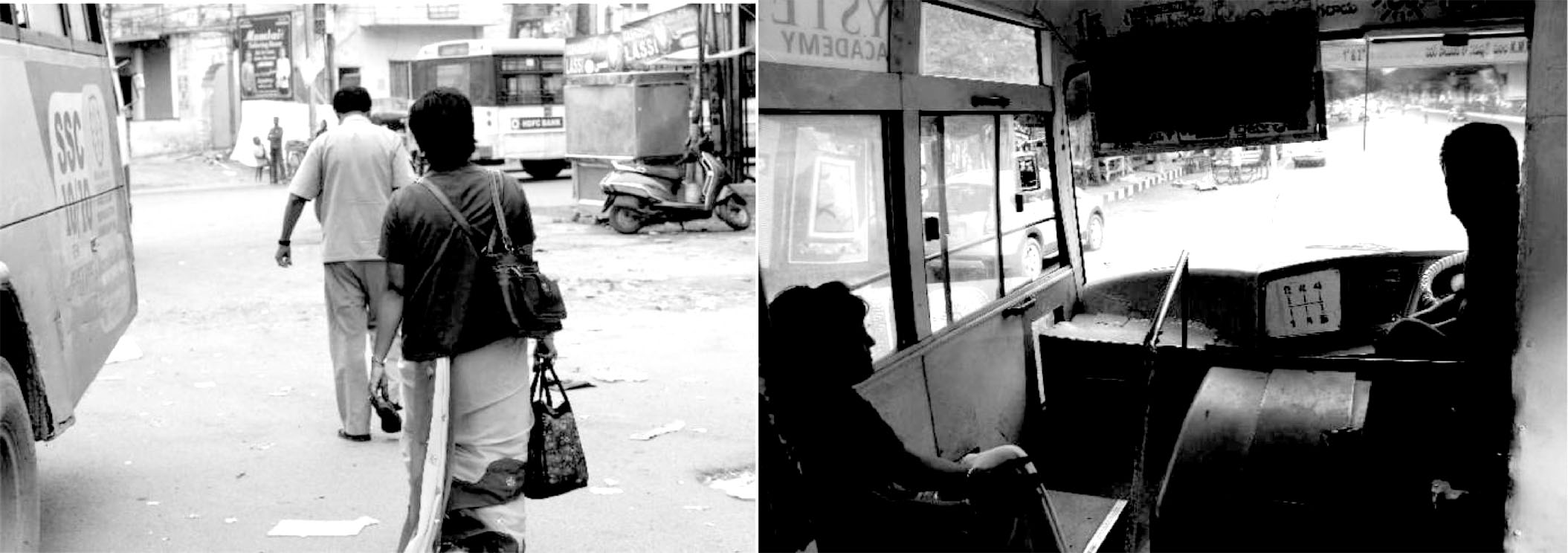 “What happened anna? Why are you so frustrated?”
“What happened anna? Why are you so frustrated?”
“Argh. My children, they have no idea how to cook rice. Grown up children! This is absolutely embarrassing. What if we had guests?!”
“Oh, children just need to be taught. You can’t expect them to be born with natural rice-cooking talent!”
“They’re supposed to have learnt by now.”
“Just teach them. Wait, you know how to cook rice, don’t you?”
Confessional silence
“Well, no wonder! All of you come home one day, and I’ll teach you to cook a meal! Now, stop moping around. We are late for the next trip!”
***
Hailing from Srisailam in Mahaboobnagar district, Urmila moved to Hyderabad with her newly married husband in 1994.
Although she vehemently denies having had any initial interest in the job she does, stating that she has become a conductor only for the money, Urmila does not disagree that she has come to enjoy her work.
“It’s the people you meet. One can’t not make friends here.”
That was indeed true. At the stopover for breakfast at Charminar, we met a community of bus drivers and conductors sharing the table, food and gossip. Mahalakshmi, a bus conductor working on the CharminarGolconda route was a particular delight to encounter. A state level athlete, Mahalakshmi was a strong woman both in her build and her words. Bold and vivacious, her jovial jabs and sharp sarcasm spared nobody. Embarrassed by her friend’s continuous outbursts, Urmila apologetically mentioned, “ She is from Dhulpet .” We learned later that Dhulpet was infamous for three reasonsproduction of country liquor, construction of Ganesh idols, and riots.
***
“I am a no-nonsense kind of person. If anybody misbehaves or refuses to buy a ticket, I ask Krishna anna to take the bus straight to the local Police Station. It always works.”
Our day trip with her proved that she needed no help navigating the bus and the sea of passengers. Urmila maintained that the absence of toilets on the routes was the primary challenge of this profession and needed to be immediately addressed by the authorities. The failure to do so until now has severely affected the health of many workers who often have to go long hours without using the toilet. We observed that Urmila herself used the toilet only once during her seven hour shift at the Charminar bus stop because she felt it was the only usable one.
***
The Law Officer of the TSRTC informed us about the importance of the Workmen Compensation Act that covers matters such as if a worker works an 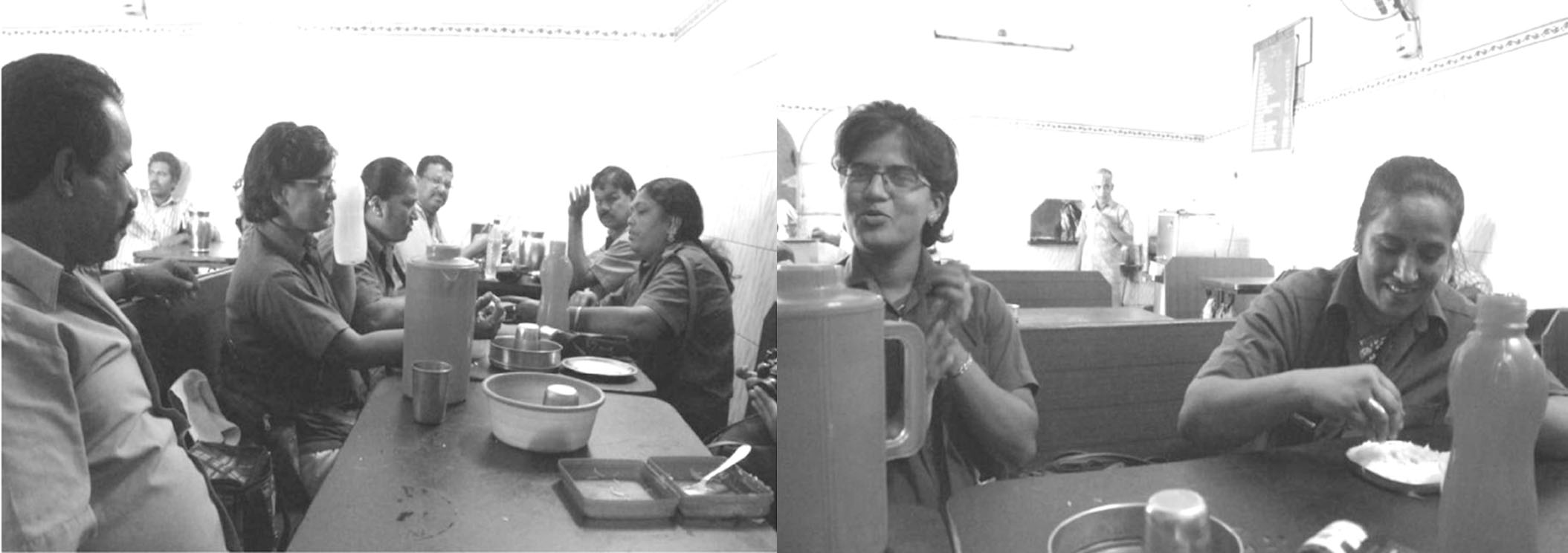 extra hour, he/she has to be paid twice the amount i.e. for two hours and if he/she works a day which is a holiday, he/she is entitled to a compensatory off. Most people applying for the post of the bus conductor are overqualified (the minimum qualification required is a 10th class certificate). Although this is not necessarily the preferred job for many, the lack of employment in their chosen fields often left them with little choice. There are several women who often start work as bus conductors and move onto technical/IT jobs on computers within TSRTC.
extra hour, he/she has to be paid twice the amount i.e. for two hours and if he/she works a day which is a holiday, he/she is entitled to a compensatory off. Most people applying for the post of the bus conductor are overqualified (the minimum qualification required is a 10th class certificate). Although this is not necessarily the preferred job for many, the lack of employment in their chosen fields often left them with little choice. There are several women who often start work as bus conductors and move onto technical/IT jobs on computers within TSRTC.
While the minimum age required is 21 years, most TSRTC employees are usually between 25-30 years of age. Apart from a few who are single, most female bus conductors are married and work to support their family, since the husband may have a non-secure job.
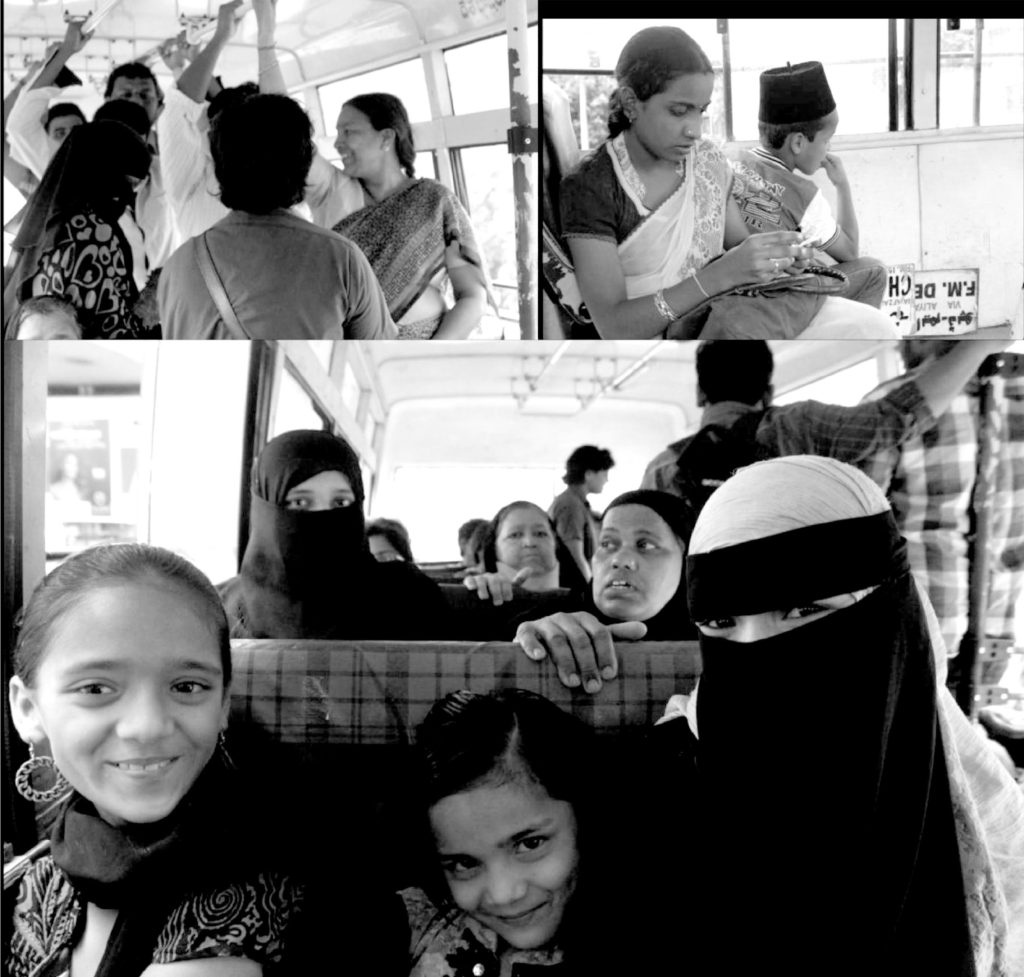 According to Deputy Chief Manager at Jubilee Bus Station, women bus conductors in the TSRTC are offered many benefits. All TSRTC employees are provided with 15 casual leaves but women get an extra 3 days. They are provided three breaks for ten minutes each during their shifts which last for seven and a half hours. Women are largely exempted from late night shifts and a policy of one day of the week off is maintained for all employees. Although there is no separate worker’s union for women, we gathered that all unions played an active role in voicing women’s issues. Interestingly, we found that although women are included in the union, they do not hold many posts, a fact that both the DCM and Urmila found striking. Over many years, the demands of female bus conductors have included: more paid leave, better sanitation facilities, day duties, light and sophisticated duties (like in AC buses as they are slightly more expensive, and are not as crowded). While most of these demands were highly motivated by caution and safety, the desire to exercise a certain degree of comfort (air-conditioned buses, small buses etc.) in the workspace can also be noted. However, in such issues, the case of seniority was strictly maintained and such desires were seldom translated into realities.
According to Deputy Chief Manager at Jubilee Bus Station, women bus conductors in the TSRTC are offered many benefits. All TSRTC employees are provided with 15 casual leaves but women get an extra 3 days. They are provided three breaks for ten minutes each during their shifts which last for seven and a half hours. Women are largely exempted from late night shifts and a policy of one day of the week off is maintained for all employees. Although there is no separate worker’s union for women, we gathered that all unions played an active role in voicing women’s issues. Interestingly, we found that although women are included in the union, they do not hold many posts, a fact that both the DCM and Urmila found striking. Over many years, the demands of female bus conductors have included: more paid leave, better sanitation facilities, day duties, light and sophisticated duties (like in AC buses as they are slightly more expensive, and are not as crowded). While most of these demands were highly motivated by caution and safety, the desire to exercise a certain degree of comfort (air-conditioned buses, small buses etc.) in the workspace can also be noted. However, in such issues, the case of seniority was strictly maintained and such desires were seldom translated into realities.
The number of women in the workspace has increased over the years but they still seem dismally low. In Hyderabad city there are a total of 9000 conductors, of which 1600-1800 are female bus conductors. “Since the 1990s the number of female bus conductors in the organization has gone up”, says the Deputy Chief Manager. As a woman overlooking all the Depots, she is of the opinion that there is a decent female representation. Of the 95 depot managers in Hyderabad city, twelve are women, a figure she feels is nominal considering they have risen with time. Women get hundred and eighty days of maternity leave and a request for extension is often agreed to by the TSRTC. According to the DCM, most women employees do come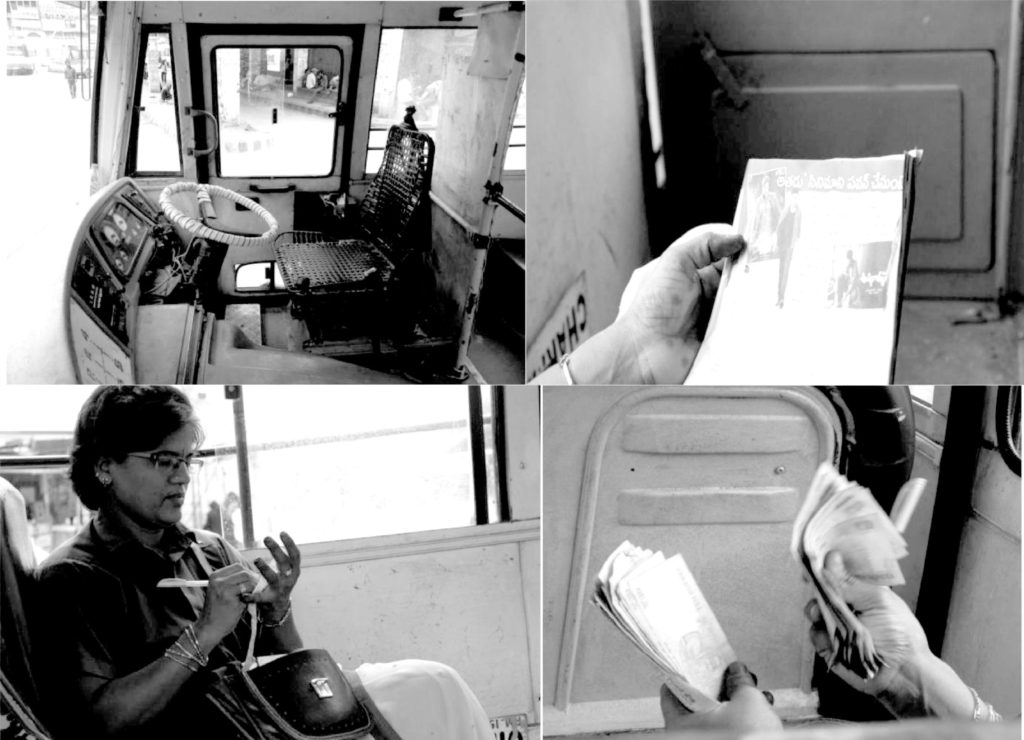 back to work after their pregnancy in order to add extra income to the household. The income earned by both male and female bus conductors is the same and increases with seniority— bus conductors start with Rs. 6000 as their base income per month and senior employees receive up to Rs. 20,000. Legal provisions do not allow for women to be employed as bus drivers due to the common perception of them being physically weak for heavy vehicle duties.
back to work after their pregnancy in order to add extra income to the household. The income earned by both male and female bus conductors is the same and increases with seniority— bus conductors start with Rs. 6000 as their base income per month and senior employees receive up to Rs. 20,000. Legal provisions do not allow for women to be employed as bus drivers due to the common perception of them being physically weak for heavy vehicle duties.
Travelling by bus not only exposed us to different parts of the city and its numerous gullies, but also helped us understand the bus as the lifeline of the city-a melting pot of all classes. Class featured as a major barrier for us through the course of the study since our middle class backgrounds often made us outsiders to many people’s lives. While we also wanted this project to cover Urmila’s life outside of work and how she balanced her
household with her workspace, obtaining access to her home proved to be a challenge that we weren’t able to overcome. Working with Urmila for an entire shift not only exposed us to the difficulties of the work of a conductor but also to the life away from home that she leads and has come to enjoy. Her job has provided her with a family outside of her home, one that she keenly acknowledges and involves even in her personal “home” life.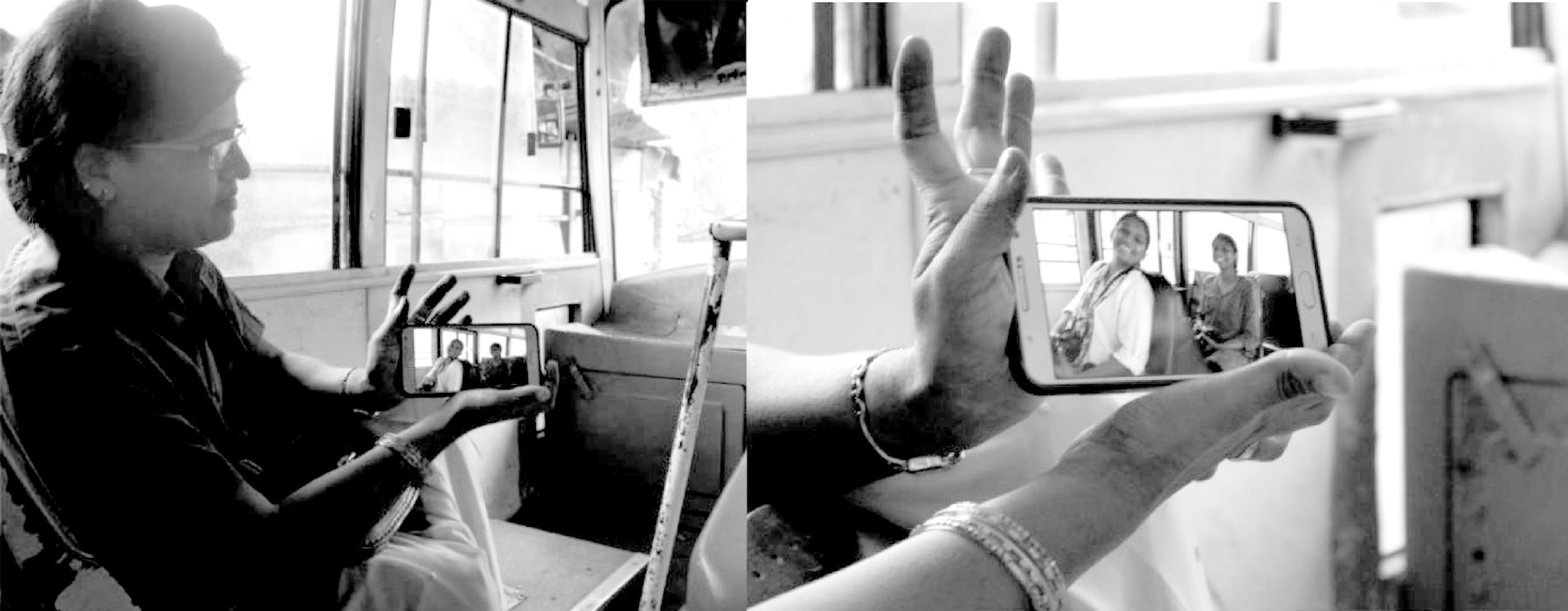
During the course of the project we came to realize that Urmila didn’t operate as a standalone individual but thrived within her professional community. We hope to expand this project to study how women build and interact in professional communities and navigate workspaces.
Devayani Prasad is doing her masters in Psychology from Ambedkar University, Delhi.
devayani.prasad@gmail.com
Anusha Sundar is doing her M.Phil in Modern History from Jawaharlal Nehru University, New Delhi.
anusha.90.96@gmail.com
(This piece is an outcome of a summer internship in 2016, done at Anveshi Research Centre for women’s studies).

